Reading阅读
- 格式:docx
- 大小:135.85 KB
- 文档页数:6
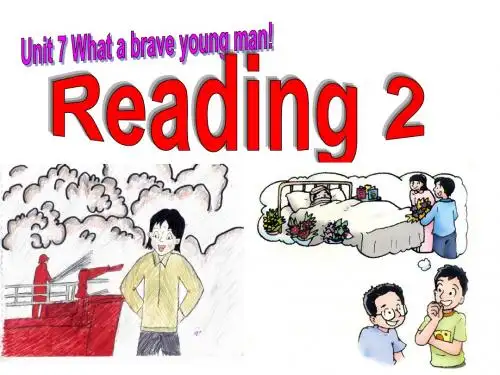
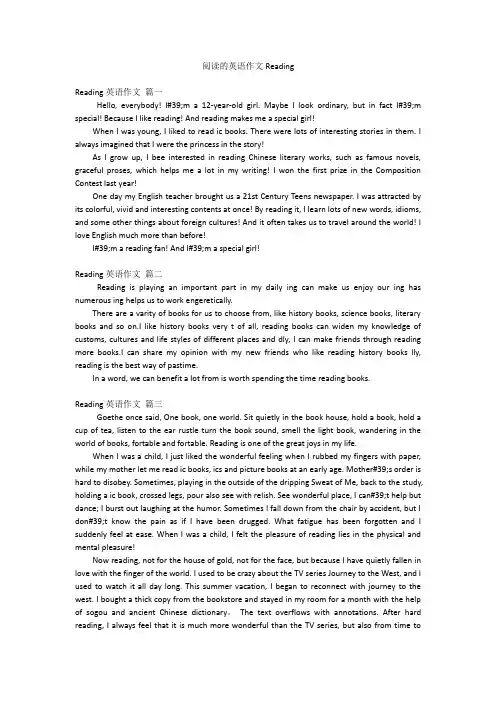
阅读的英语作文ReadingReading英语作文篇一Hello, everybody! I#39;m a 12-year-old girl. Maybe I look ordinary, but in fact I#39;m special! Because I like reading! And reading makes me a special girl!When I was young, I liked to read ic books. There were lots of interesting stories in them. I always imagined that I were the princess in the story!As I grow up, I bee interested in reading Chinese literary works, such as famous novels, graceful proses, which helps me a lot in my writing! I won the first prize in the Composition Contest last year!One day my English teacher brought us a 21st Century Teens newspaper. I was attracted by its colorful, vivid and interesting contents at once! By reading it, I learn lots of new words, idioms, and some other things about foreign cultures! And it often takes us to travel around the world! I love English much more than before!I#39;m a reading fan! And I#39;m a special girl!Reading英语作文篇二Reading is playing an important part in my daily ing can make us enjoy our ing has numerous ing helps us to work engeretically.There are a varity of books for us to choose from, like history books, science books, literary books and so on.I like history books very t of all, reading books can widen my knowledge of customs, cultures and life styles of different places and dly, I can make friends through reading more books.I can share my opinion with my new friends who like reading history books lly, reading is the best way of pastime.In a word, we can benefit a lot from is worth spending the time reading books.Reading英语作文篇三Goethe once said, One book, one world. Sit quietly in the book house, hold a book, hold a cup of tea, listen to the ear rustle turn the book sound, smell the light book, wandering in the world of books, fortable and fortable. Reading is one of the great joys in my life.When I was a child, I just liked the wonderful feeling when I rubbed my fingers with paper, while my mother let me read ic books, ics and picture books at an early age. Mother#39;s order is hard to disobey. Sometimes, playing in the outside of the dripping Sweat of Me, back to the study, holding a ic book, crossed legs, pour also see with relish. See wonderful place, I can#39;t help but dance; I burst out laughing at the humor. Sometimes I fall down from the chair by accident, but I don#39;t know the pain as if I have been drugged. What fatigue has been forgotten and I suddenly feel at ease. When I was a child, I felt the pleasure of reading lies in the physical and mental pleasure!Now reading, not for the house of gold, not for the face, but because I have quietly fallen in love with the finger of the world. I used to be crazy about the TV series Journey to the West, and I used to watch it all day long. This summer vacation, I began to reconnect with journey to the west. I bought a thick copy from the bookstore and stayed in my room for a month with the help of sogou and ancient Chinese dictionary。
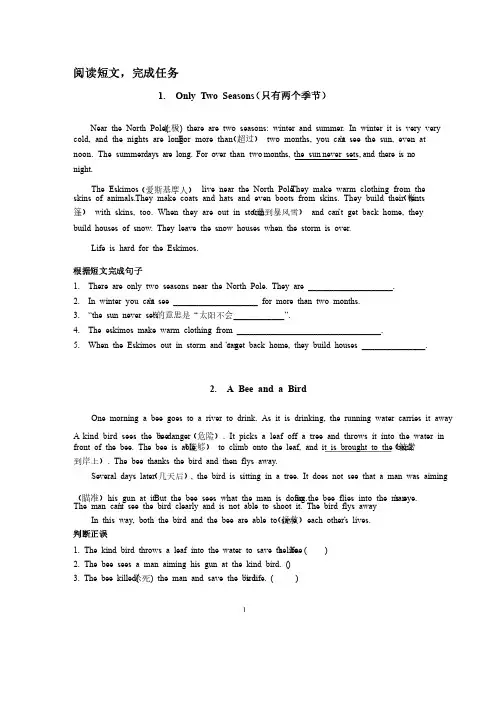
1 阅读短文,完成任务1. Only Two Seasons (只有两个季节)Near the North Pole(北极) there are two seasons: winter and summer. In winter it is very very cold, and the nights are long. For more than (超过)(超过)(超过) two months, you can ’t see the sun, even at noon. The summer d ays days days are are are long. long. long. For For For over over over than two than two months, months, the sun the sun never sets, and and there there there is is is no no night. The Eskimos (爱斯基摩人)(爱斯基摩人) live near the North Pole. They make warm clothing from the skins of animals. T hey make coats and hats and even boots from skins. They build their tents They make coats and hats and even boots from skins. They build their tents (帐篷)篷) with skins, too. When they are out in storm (遇到暴风雪)(遇到暴风雪) and can’t get back home, they build houses of snow. They leave the snow houses when the storm is over. Life is hard for the Eskimos. 根据短文完成句子1. There are only two seasons near the North Pole. They are ____________________. 2. In winter you can ’t see ____________________ for more than two months. 3. “the sun never sets ”的意思是“太阳不会________________________””. 4. The eskimos make warm clothing from __________________________________. 5. When the Eskimos out in storm and can ’t get back home, they build houses _______________. 2. A Bee and a Bird One morning a bee goes to a river to drink. As it is drinking, the running water carries it away . A kind bird sees the bee ’s danger (危险). It picks a leaf off a tree and throws it into the water in front of the bee. The bee is able (能够)(能够) to climb onto the leaf, and it is brought to the bank (被带到岸上). The bee thanks the bird and then flys away. Several days later (几天后), the bird is sitting in a tree. It does not see that a man was aiming (瞄准)his gun at it. But the bee sees what the man is doing. So the bee flies into the man ’s eye. The man can ’t see the bird clearly and is not able to shoot it. The bird flys away . In this way, both the bird and the bee are able to save (挽救)each other each other’’s lives. 判断正误1. The kind bird throws a leaf into the water to save the bee ’s life. ( ) 2. The bee sees a man aiming his gun at the kind bird. ( ) 3. The bee killed(杀死) the man and save the bird ’s life. ( ) 3. What are you doing with my carOne day Mr. and Mrs. White go shopping by car. They stop their car near a store. They buy a lot of things and they want to put the things in the car. But Mr. White can’t open the door of the car, so they ask a policeman to help them. The policeman is very friendly to help them. Just then a man comes up and shouts: “What are you doing with my car?” Mr. and Mrs. White take a look at the car’s number and they are frozen there. It isn’t their car. 选择1. Mr. and Mrs. White drive for ___________. A. fishing B. shopping C. business 2. They stop their car _________. A. at the parking spot B. near the sea C. near the store 3. Mr. White can’t open the car, so __________.A. they walk home B. they ask a policeman to help C. they call a taxi 4. Mr BrownMr Brown lives in a nice house in a small town with his wife(妻子) , Mrs Brown. From Monday to Friday he works in an office near his house. He is free on Saturdays and Sundays. He has a nice garden beside his house. He likes growing flowers and he often works in the garden on Saturdays and Sundays. The flowers are very beautiful and Mrs Brown likes them very much. She often helps Mr Brown. 选择1. Mr Brown lives in _________with his wife. A. a city B. a small town C. a big town 2. He works_________ days a week in his office. A. four B. five C. six 3. He isn’t _________on Saturdays and Sundays. A. free B. busy C. happy 4. He likes _________ on Saturdays and Sundays. A. working in his garden B. walking in his garden C. looking at his garden 5. The New Park There is a new park near my house. It’s a fine day today. My family and I are in the park now. On my left, there is a cafe. On my right, there is a big lake. There are many fiowers and trees near swim in the lake. There’s a small hill behind the lake. Near the lake, there is a sign. It says,“Don’t2 river, so he stopped to watch him quietly. After a few minutes, the fisherman pulled his line in(往回拉线). so he spoke to(”the water and keep only that small one?“A small frying pan.”The fisherman looked up and answered, l回答问题回答问题1.How many big fishes did the fisherman throw back into the river? He threw _________________________ back into the river. 2.Why did the fisherman only want the small fish? Because he only had ______________________. l从文章中找出下列动词的过去式从文章中找出下列动词的过去式is________ see ________ stop __________ pull __________ threw_________ look ________ 4 。

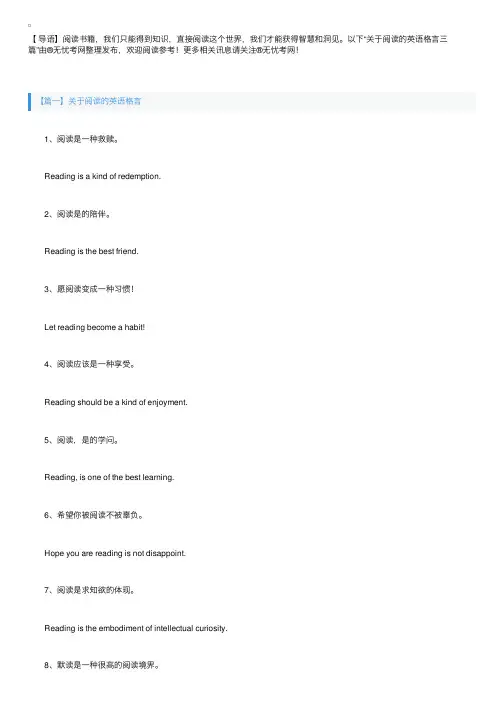
【导语】阅读书籍,我们只能得到知识,直接阅读这个世界,我们才能获得智慧和洞见。
以下“关于阅读的英语格⾔三篇”由®⽆忧考⽹整理发布,欢迎阅读参考!更多相关讯息请关注®⽆忧考⽹!【篇⼀】关于阅读的英语格⾔ 1、阅读是⼀种救赎。
Reading is a kind of redemption. 2、阅读是的陪伴。
Reading is the best friend. 3、愿阅读变成⼀种习惯! Let reading become a habit! 4、阅读应该是⼀种享受。
Reading should be a kind of enjoyment. 5、阅读,是的学问。
Reading, is one of the best learning. 6、希望你被阅读不被辜负。
Hope you are reading is not disappoint. 7、阅读是求知欲的体现。
Reading is the embodiment of intellectual curiosity. 8、默读是⼀种很⾼的阅读境界。
Silent reading is a very high reading level. 9、阅读要做笔记,写作先写⽇记。
Reading to take notes, writing to write a diary. 10、学会阅读⽓氛,⽐什么都重要。
Learn to read atmosphere, ratio what all important. 11、阅读,让我们感觉到不再孤单。
Reading, let us feel no longer lonely. 12、阅读能培养⼈的性情,陶冶情操。
Reading can cultivate people's temperament, edify sentiment. 13、重新阅读过去,才发现那是青春。
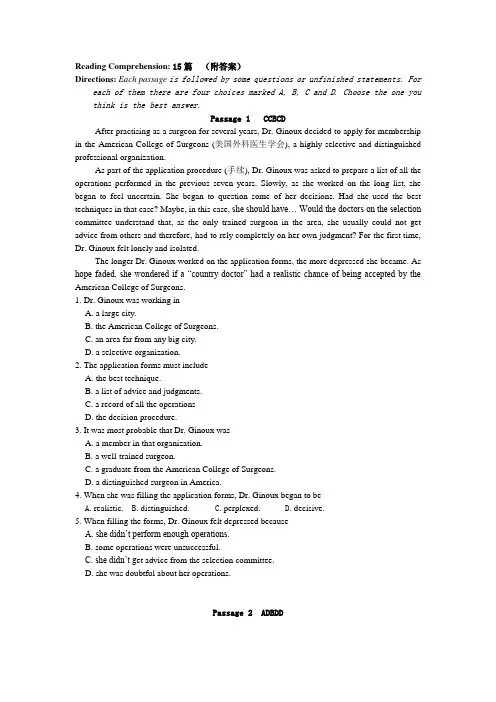
Reading Comprehension: 15篇(附答案)Directions: Each passage is followed by some questions or unfinished statements. For each of them there are four choices marked A, B, C and D. Choose the one you think is the best answer.Passage 1 CCBCDAfter practising as a surgeon for several years, Dr. Ginoux decided to apply for membership in the American College of Surgeons (美国外科医生学会), a highly selective and distinguished professional organization.As part of the application procedure (手续), Dr. Ginoux was asked to prepare a list of all the operations performed in the previous seven years. Slowly, as she worked on the long list, she began to feel uncertain. She began to question some of her decisions. Had she used the best techniques in that case? Maybe, in this case, she should have… Would the doctors on the selection committee understand that, as the only trained surgeon in the area, she usually could not get advice from others and therefore, had to rely completely on her own judgment? For the first time, Dr. Ginoux felt lonely and isolated.The longer Dr. Ginoux worked on the application forms, the more depressed she became. As hope faded, she wondered if a “country doctor” had a realistic chance of being accepted by the American College of Surgeons.1. Dr. Ginoux was working inA. a large city.B. the American College of Surgeons.C. an area far from any big city.D. a selective organization.2. The application forms must includeA. the best technique.B. a list of advice and judgments.C. a record of all the operationsD. the decision procedure.3. It was most probable that Dr. Ginoux wasA. a member in that organization.B. a well-trained surgeon.C. a graduate from the American College of Surgeons.D. a distinguished surgeon in America.4. When she was filling the application forms, Dr. Ginoux began to beA.realistic.B.distinguished.C.perplexed.D.decisive.5. When filling the forms, Dr. Ginoux felt depressed becauseA. she didn’t perform enough operations.B. some operations were unsuccessful.C. she didn’t g et advice from the selection committee.D. she was doubtful about her operations.Passage 2 ADBDDAfter a busy day of work and play, the body needs to rest. Sleep is necessary for good health. During this time, the body recovers from the activities of the previous day. The rest that you get while sleeping enables your body to prepare itself for the next day.There are four levels of sleep, each being a little deeper than the one before. As you sleep, your muscles(肌肉) relax little by little. Your heart beats more slowly, and your brain slows down. After you reach the fourth level, your body shifts back and forth from one level of sleep to the other.Although your mind slows down, from time to time you will dream. Scientists who study sleep tell us that when dreaming occurs, your eyeballs begin to move more quickly (although your eyelids are closed). This period of sleep is called REM, which stands for rapid eye movement.If you can’t fall asleep, some people recommend breathing very slowly and very deeply. Other people believed that drinking warm milk will help make you drowsy. There is also an old suggestion that counting sheep will put you to sleep!1. A good title for this passage is ________.A. SleepB. Good HealthC. DreamsD. Work and Rest2. The word “drowsy” in the last paragraph means _________.A. sickB. stand upC. awakeD. a little sleepy3. This passage suggests that not getting enough sleep might make you______.A. dream more oftenB. have poor healthC. nervousD. breathe quickly4. During REM, ________________.A. your eyes move quicklyB. you dreamC. you are restlessD. both A and B5. The average number of hours of sleep that an adult needs is __________.A. approximately six hoursB. around ten hoursC. about eight hoursD. not stated herePassage 3 CACBCTokyo is one of those places that you can love and hate at the same time.In Tokyo there are always too many people in the places where I want to be. Of course there are too many cars. The Japanese drive very fast when they can. But in Tokyo they often spend a long time in traffic jams. Tokyo is not different when one wants to walk.At certain times of the day there are a lot of people on foot in London's Oxford Street. But the streets near Ginza in Tokyo always have a lot of people on foot, and sometimes it is really difficult to walk. People are very polite; there are just too many of them.The worst time to be in the street is at 11:30 at night. That is when the night-clubs are closing and everybody wants to go home. There are 35,000 night-clubs in Tokyo, and you do not often see one that is empty.Most people travel to and from work by train. Tokyo people buy six million train tickets every day. At most stations, trains arrive every two or three minutes, but at certain hours there do not seem to be enough trains. Although they are usually crowded, Japanese trains are very good. They always leave and arrive on time. On a London train you would see everybody reading a newspaper. In Tokyo trains everybody in a seat seems to be asleep, whether his journey is long or short.In Tokyo, I stood outside the station for five minutes. Three fire-engines raced past on the way to one of the many fires that Tokyo has every day. Tokyo has so many surprises that none of them can really surprise me now. instead, I am surprised at myself: I must go there next year on business. I know I hate the overcrowded city. But I feel like a man who is returning to his long-lost love.1. Tokyo is different from London in that ____________.A. it has a smaller populationB. it is an international cityC. it is more difficult to go somewhere on foot in TokyoD. its people are friendlier and more polite.2. What time does the writer think is the worst time to go into the street?A. When the night-clubs are closing.B. At 8 o'clock in the morning.C. When the train is overcrowded.D. At 11:30 a.m.3. What does the writer say about Japanese trains?A. There are not enough trains.B. They are very nice and comfortable.C. They leave and arrive at the right time.D. They often run behind schedule.4. From the writer's observation, we can see that fires break out in Tokyo _______.A. occasionally.B. quite frequentlyC. not very oftenD. twice a day5. The writer hates Tokyo mainly because the city _________.A. is dirty and the people are impoliteB. has been seriously pollutedC. is crowded and noisyD. is not modern enoughPassage 4 DCCCBEvery ten years there is a national census(人口普查) to count the number of people. The Census Office asks every household to answer questions on a census form. The census counts people by the kind of housing they live in, the country in which they were born, and the kind of job they do and how they travel to work. Census results are used by a great many people and areavailable to everyone in many ways.For example, in order to work out present and future needs we must know how people are housed now, and the sizes and ages of their families. For hospitals, schools and other local services, the size of annual grants(拨款) made by the Government to these services depends largely on the numbers and needs of people in the area.Many of the figures come from the census. In order to work out future spending for pensions (养老金), we need to know people's ages, how many are men and how many are women, whether they are single or married, and the size of the family. The census shows how many people have moved from one area to another and how the local workforce is changing. This information is used when factories, offices, shops, public transport and places for leisure are being planned. The census is taken in order to provide figures about the nation as a whole. It does not give information about any named person, family or household. Names and addresses are needed to take the census accurately, but they are not fed into the computer. After the census, the forms are locked away and will not be released to anyone outside the Census Office for 100 years. The answers you give on your census form will be treated secretly. No one outside the Census Office will see your completed form - but if you refuse to complete your form properly, you may be taken to court and the form could be produced as evidence. Everyone working on the census is required to keep it secret and can be accused if he or she improperly reveals information.1. It is necessary to know what sort of housing conditions people have in order to plan ________.A) the sizes and ages of familiesB) the sizes and ages of housesC) how many presents will be neededD) how many houses need to be built2. The census shows the changes that have taken place regarding ______.A) the number of people who work in the areaB) the number of buses in the areaC) the strength of workers in the areaD) the use of power in the area3. Which of the following statements is true?A) There is no information about people's names on the census forms.B) The census would not be accurate if the information was fed into a computer.C) The census gives information about the whole country.D) Named people and families do not need to give information.4. Information about names and addresses ________.A) is stored in the computer for 100 yearsB) is not usually accurateC) will not be seen by anyoneD) will be made public in 100 years5. The people who work on the census _______.A) will not see the completed formsB) have promised not to reveal informationC) are not allowed to keep the information in memoryD) are secretly trainedPassage 5 CBCAAIf you are like most people, your intelligence varies from season to season. You are probably sharper in the spring than you are at any other time of the year.A famous scientist, Ellsworth Huntington(1876-1974), concluded, from his work among peoples in different climates that climate and temperature have a definite effect on our mental abilities.He found that cool weather is much more favorable for creative thinking than is summer heat. This does not mean that all people are less intelligent in the summer than they are during the rest of the year. It does mean, however, that the mental abilities of large numbers of people tend to be lowest in the summer.Spring appears to be the best period of the year for thinking. One reason may be that in spring man’s mental abilities are affected by the same factors that bring about rapid growth of everything in nature.Fall is the next-best season, then winter. As for summer, it seems to be good time to take a long vacation from thinking.1. According to this passage, your intelligence probably________.A. stays the same throughout the yearB. varies from day to dayC. changes with the seasonsD. changes from year to year2. Huntington based his conclusions on __________.A. records of changes in his own intelligenceB. his work among peoples in different climatesC. records of temperature changesD. all of the above3. It seems that the cold of winter _________.A. increases the ability to thinkB. is the best time for thinkingC. is better for thinking than the heat of summerD. decreases the ability to think4. One possible reason why spring is the best season for thinking is that______.A. everything in nature, including man, is growing then.B. it lasts longer than the other seasons.C. it is not too warm and not too coldD. both B and C5. The two best seasons for thinking seem to be _________.A. spring and fallB. winter and summerC. summer and springD. fall and winterPassage 6 ABCADSurprise! You’re in college! “I never knew living with a roommate was so hard.” “I can’t believe the amount of reading required for just one class.” “I didn’t know what the Freshman 20was until I gained 20 pounds.” No matter how hard or how long you plan for college, it’s f illed with surprises, from dorm conflicts and academic rigors(严酷;艰苦)to the relationship maze and campus logistics(后勤). Students at Northwestern College in Saint Paul, Minn., share surprises they encountered to give freshmen a “heads up” on what to expect when entering the ivy-covered walls this fall.Dorm LifeAdjusting to a roommate’s music preferences, sleeping times and tastes in dorm was a surprise to Emily Carlson,a communication major. “I was an only child used to my own room, so it was a chall enge adjusting to roommates.” “At first it felt like being at summer camp,” recalls Kristy Lindquist, a cross-cultural ministry major. “Eventually one becomes accustomed to it, after growing from both good and bad experiences.” At the beginning of her fres hman year, Amber White, a music major, thought she’d get close to one roommate in particular, but it wasn’t the case. “I thought I’d get along better with my roommates, but overall the friends I made in the first weeks were not the friends I actually kept.” The housekeeping aspects of the sexes surprised senior Ben Hemmila, president of the Northwestern Student Association. “Guys’ dorms smell bad no matter what happens! Girls’ dorms are generally messier than guys’, but smell better.”AcademicsNeed to study for a mid-term exam or finish a term paper? Get ready to burn the midnight oil ― and the early-morning oil! “Late in college means 3-4 a.m. not 10-11 p.m.” says Hemmila. Carlson agrees. “With other obligations, like work and social things, studying until 3 a.m. is not unusual.” Yet she was surprised at her stamina(体力;精力;活力). “I’ve stayed up 48, even 72 hours studying ― thanks to coffee and willpower. Staying up isn’t that hard. The difficult part is keeping everything in your brain.” Another common s urprise is the vast amount of reading college requires: 50-60 pages a night ― per class! Hemmila was surprised he didn’t get a detention(延迟;留置;拘留)when he skipped a class. But he still paid the tuition for that skipped class. S tudents are surprised to realize their education needs to include personal discipline and time management. “There is never enough time,” realizes Katie Dean, a business major. “I can’t be involved in everything like in high school, and even a part-time job is hard with a full load.” P aul Bradley, dean of residence life at Northwestern College, says freshmen usually find they have more homework than expected and finals are more difficult. “They’re surprised because they get fewer directives from professors on how to study and what to st udy.”As for that Freshman 20, Murphy hears from many students who were amazed how quickly they gained weight. “It’s the reality of inactivity ― sitting in class, studying, then eating pizza.”1. According to the passage above, the Freshman 20 is _____.A.a new student who is almost 20B.a freshman who gains 20 pounds quicklyC.a new students who is 20 poundsD.a freshman who always gains weight 20 pounds a year2. What might “burn the midnight oil” mean in this passage?A.To burn something at night with oil.B.To stay up studying.C.To burn the mid-term exam or a term paper at night.D.To get up late.3. The following statements are mentioned EXCEPT _____.A.bo ys’ dorms do not smell good no matter what happensB. it was a challenge for those who live in their own rooms at home to adjust to roommatesC. students are not surprised to know the y need personal discipline and time managementD. coffee and willpower can help students study at night for long time4. What can we know from the passage based on the author’s opinion?A.Time and tide wait for no man.B.It is easy for students to adjust to the new college life.C.Dorm life is different from the life at home.D.Freshmen know what to do because they can get much help from professors.5. This passage mainly tells us ______.A.dorm life in collegeB.academics in collegeC.new s tudents life at Northwestern CollegeD.surprise at dorm life and academics of the new students in collegePassage7 DCBABWhat can you do when you find yourself in school without enough friends? Making friends on campus is not the easiest thing to do especially when you are new on campus or you go to an urban commuter campus. Meeting people at school need s not be a daunting task. There are several methods that are not difficult to master and you may find easy when you try them out.Start by looking around at people you tend to see frequently, such as, people who you see in your classes, dorms and dining areas. Often an easy way to start a conversation is to focus on an area of obvious common interest. For example, before or after classes, ask, “did you get the assignment for next week”, or “ what did you think of the professor’s theory of...”This gets you pas s the most difficult part, which is starting the first conversation. Be sure to introduce yourself before the end of the conversation.If your campus has a dining facility, cafe or coffee cart, then there will be more opportunities for meeting people. After you’ve introduced yourself and talked about class, it’s the perfect time to ask the other person to join you for a cup of coffee. Once you are at the table it should be easier to talk about where you’re from, what is your major, what you think of the class, whether it is easy or hard. Once you start a conver sation, you’ve gotten past the most difficult part. It will be much easier to suggest meeting again for coffee, or to meet socially off campus.Put yourself where there are other people that you will see over and over. Join a club, interest group or sports team. Obviously if you live in a dormitory you will have chances to interact with people in your dorm floor as well as the dorm cafeteria. Make it a point of inviting people to meet you for breakfast, lunch or dinner. Don’t be a cockroach —someone who hangs out in a dark room and scurries(急转,疾行) when the lights are turned on.Working on Campus is also a good way to meet people, as well as put some money in your pocket, while solving two problems at once. Social events can be good ways to meet people. School dances, campus mixers and happy hours may seem to make you have something in common to talk about.1. In the first paragraph, the author seems trying to convey the following EXCEPT _____.A. making friends is a hard thing on campusB. we can do nothing about making friendsC. there are methods of making friends that may be of helpD. none of the above2. The expression ‘cockroach’ (Line 5, Para. 4) in this passage probably refers to _____.A. the insect that comes out at night and seldom goes out in the daytimeB. someone who comes out at night and seldom goes out in the daytimeC. someone who often stays in a dorm and only goes out when necessaryD. someone who often hangs around and only meets people on campus3. The methods of making friends include the following statements EXCEPT _____.A. joining in a sports teamB. taking up a part-time jobC. studying in a place frequentlyD. asking someone to join you for a cup of coffee4. The possible reason that the author suggests you ask ‘did you get the a ssignment for next week’ is _____.A. to start a conversationB. to know why he or she did n’t finish the assignmentC. to get help from him or her assignmentD. to collect the assignment for the professor5. What this passage mainly discusses is______.A. the importance of making friends on campusB. making friends on campus is very easyC. m eeting and m aking f riends on c ampusD. life on campusPassage 8 DCBBAOne cold morning in winter, when I was a little boy, a smiling man with an ax on his shoulder sto pped me, saying, “My pretty boy, has your father a grindstone ( 磨刀石)?”“Yes, sir,” said I.“You are a fine little fellow!” said the man. “Will you let me grind my ax?”Pleased with the flattery, I answered, “Oh, yes, sir. The grindstone is down in the shop.”Patting me on my head, he said, “Will you get me some hot water?” I ran and brought the hot water.“How old are you, and what is you name?” he asked, without waiting for a reply, “I’m sure you are one of the finest boys I have ever seen. Will you turn the grindstone a few minutes for me?”Hearing the flattery again, I went to work with a will. It was a new ax, and I worked hard until I was almost tired to death. The school bell rang, but I could not get away, because the ax was not half ground.At last, however, it was sharpened. Then the man turned to me and said, “Now, you little rascal (小坏蛋), you have played truant ( 旷课)! Run to school, or you’ll be sorry!”“Alas!” thought I. “It was hard enough to turn a grindstone this cold day, b ut now to be called a rascal is too much.”The memory of turning the grindstone that winter morning sank deep into my mind. I have thought of it since. Now, whenever I hear words of flattery, I say to myself. “That man has an ax to grind.”1. Which of the following did the man with the ax NOT do that morning?A. Flattering the boy with nice words.B. Patting the boy on the head.C. Blaming the boy with sharp words.D. Giving the boy a small toy.2. T he man ask ed the boy so many questions ________.A. to know how old the boy wasB. to know if his father was at homeC. to let the boy grind his axD. to know the study about the boy3. What did NOT happen to the boy when the work was finished?A. He was tired.B. He was praised by the man.C. He was late for school.D. He felt hurt by the man’s words.4. The man called the boy “rascal” because _______.A. his ax was done wellB. he thought that the boy should go to school on timeC. his ax was damagedD. he di dn’t want the boy to go to school5. Today in the English language, “That man has an ax to grind” means _______.A. that man has some selfish reasons for his actionsB. that man needs to sharpen his axC. that man is very kind to boysD. that man works with an axPassage 9 DCACDWhy is setting goals important? Because goals can help you do, be, and experience everything you want in life. Instead of just letting life happen to you, goals allow you to make your life happen.Successful and happy people have a vision of how their life should be and they set lots of goals (both short-term and long-range) to help them reach their vision. By setting goals you are taking control of your life. It’s like having a map to show you where you want to go. Think of it this way. There are two drivers. One has a destination in mind (her goal) which is laid out for her on a map. She can drive straight there without any wasted time or wrong turns. The other driver has no goal or destination or map. She starts off at the same time from the same place as the first driver, but she drives aimlessly around, never getting anywhere, just using up gas and oil. Which driver do you want to be?Winners in life set goals and follow them. Winners decide what they want in life and then get there by making plans and setting goals. Unsuccessful people just let life happen by accident. Goals aren’t difficult to set and they aren’t difficultto reach. It’s up to you to find out what your goals, ideals and visions really are. You are the one who must decide what to pursue and in what direction to aim your life.Research tells us that when we write a goal down we are more likely to achieve it. Written goals can be reviewed regularly, and have more power. Like a contract with yourself, they are harder to neglect or forget. Also when you write your goals in a particular fashion you are able to stimulate your subconscious to be continuously alert to situations that will further your goal.1) The example of two drivers in the second paragraph is cited to show __________.A. the difficulty of driving without a mapB. the foolishness of the second driverC. the importance of avoiding wrong turnsD. the significance of setting goals2) Successful people differ from unsuccessful ones in that __________.A. the former set goals which are difficult to achieveB.the latter make unreasonable demands of themselvesC.the former have goals in life and make plans to carry them outD. the latter set goals and try to get other people to help them3) According to the writer, what is the most important in the whole process of realizing one’s goal?A.Trying to be realistic about one’s capabilities.B. Analyzing problems that may be involved.C. Having a clear understanding of what one wants in life.D. Dreaming of a very beautiful future.4) What is suggested if people want to realize their goals without fail?A. They should write down their goals.B. They should sign a contract with other people involved.C. They should be aware of the difficulties they are faced with.D. They should discuss with other people about their goals.5) Which of the following statements is closest to the main idea of the passage?A. Success is possible only when a person has set his or her goal clearly.B. Goals enable people to achieve everything they desire in life.C. Winners of any competition should never be satisfied with themselves.D. Goals must be realistic and within the realm of possibility.Passage 10 BCDCCIt was a quarter past nine as Marie hurried into the office building where she was going to work. Her bus had inched along through heavy morning traffic, making her a few minutes late for her very first job. She decided to start out half an hour earlier the next day. Once inside the lobby, she had to stand at the elevators and wait several minutes before she could get on one going to the sixth floor. When she finally reached the office marked “King Enterprises,” she knocked at the door nervously and waited. There was no answer. She tapped on the door again, but still there was no reply. From inside the next office, she could hear the sound of voices,so she opened the door and went in. Although she was sure it was the same office she had been in two weeks before when she had the interview with Mr. King, it looked quite different now. In fact, it hardly looked like an office at all. The employees were just standing around chatting and smoking. At the far end of the room, somebody must have just told a good joke, she thought, because there was a loud burst of laughter as she came in. For a moment she had thought they were laughing at her. Then one of the men looked at his watch, clapped his hands and said something to the others. Quickly they all went to their desks and, in a matter of seconds, everyone was hard at work. No one paid any attention to Marie. Finally she went up to the man who was sitting at the desk nearest to the door and explained that this was her first day in the office. Hardly looking up from his work, he told her to have a seat and wait for Mr. King, who would arrive at any moment. Then Marie realized that the day’s work in the office began just before Mr. King arrived. Later she found out that he lived in Connecticut and came into Manhattan on the same train every morning, arriving in the office at 9:35, so that his staff knew exactly when to start working.1) Marie felt nervous when she knocked at the door because _______.A. it was her first day in a new jobB. she was a little bit late for workC. she was afraid that she had gone to the wrong placeD. there was no answer from inside the office2) Marie could hardly recognize the office she went into as _______.A. the office had a new appearanceB. Mr. King was not in the officeC. nobody was doing any workD. she had been there only once3) The people in the office suddenly started working because _______.A. they saw a stranger in the officeB. they had finished their morning breakC. no one wanted to talk to MarieD. the boss was about to arrive4) We can infer from the text that the employees of the enterprise _______.A. would start their work by listening to a jokeB. were cold to newcomersC. lacked devotion to the companyD. were always punctual for work5) The best title for this text would be _______.A. Punctual Like A ClockB. A Cold WelcomeC. An Unpunctual ManagerD. Better Late Than NeverPassage 11 BCDBBI was only eight years old when the Second World War ended, but I can still remember about the victory celebrations in the small town where I lived on the day when the war in Europe ended. We had not suffered much from the war there, though like most children of my age, I was used to seeing bombed houses in the streets and the enormous army lorries (卡车)passing through. But both at home and at school I had become accustomed to the phrases “before the war ” and “when the war’s over”. “Before the war”, apparently, things had been better, though I was too young to understand why, except that there had been no bombs then, and people had eaten things like ice。
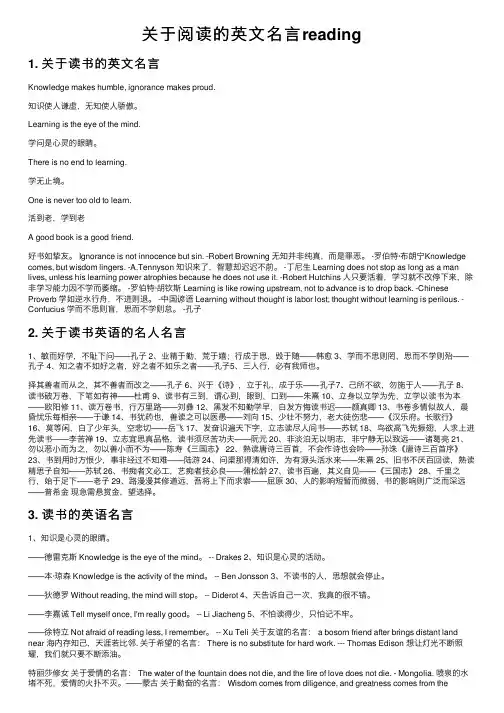
关于阅读的英⽂名⾔reading1. 关于读书的英⽂名⾔Knowledge makes humble, ignorance makes proud.知识使⼈谦虚,⽆知使⼈骄傲。
Learning is the eye of the mind.学问是⼼灵的眼睛。
There is no end to learning.学⽆⽌境。
One is never too old to learn.活到⽼,学到⽼A good book is a good friend.好书如挚友。
Ignorance is not innocence but sin. -Robert Browning ⽆知并⾮纯真,⽽是罪恶。
-罗伯特·布朗宁Knowledge comes, but wisdom lingers. -A.Tennyson 知识来了,智慧却迟迟不前。
-丁尼⽣ Learning does not stop as long as a man lives, unless his learning power atrophies because he does not use it. -Robert Hutchins ⼈只要活着,学习就不改停下来,除⾮学习能⼒因不学⽽萎缩。
-罗伯特·胡钦斯 Learning is like rowing upstream, not to advance is to drop back. -Chinese Proverb 学如逆⽔⾏⾈,不进则退。
-中国谚语 Learning without thought is labor lost; thought without learning is perilous. -Confucius 学⽽不思则盲,思⽽不学则怠。
-孔⼦2. 关于读书英语的名⼈名⾔1、敏⽽好学,不耻下问——孔⼦2、业精于勤,荒于嬉;⾏成于思,毁于随——韩愈3、学⽽不思则罔,思⽽不学则殆——孔⼦4、知之者不如好之者,好之者不如乐之者——孔⼦5、三⼈⾏,必有我师也。
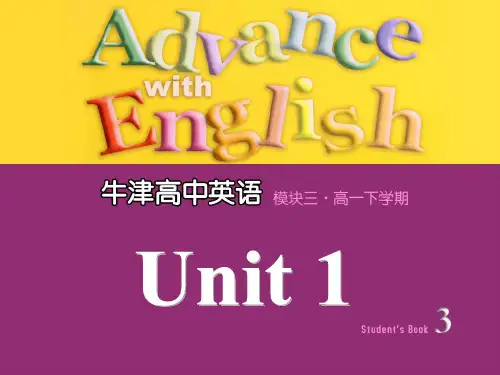
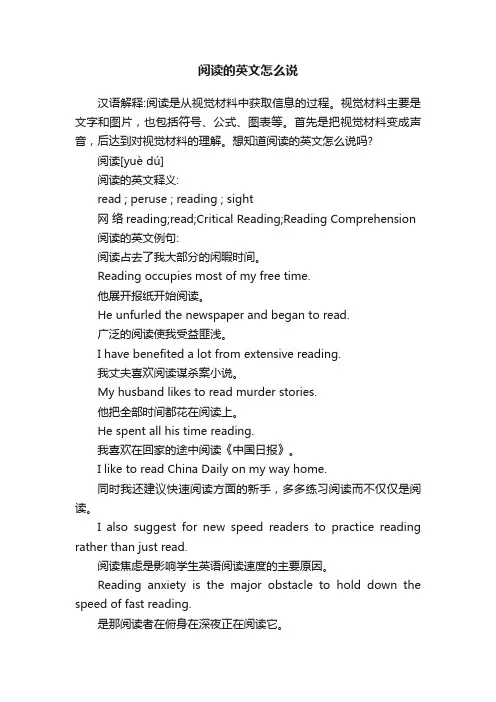
阅读的英文怎么说汉语解释:阅读是从视觉材料中获取信息的过程。
视觉材料主要是文字和图片,也包括符号、公式、图表等。
首先是把视觉材料变成声音,后达到对视觉材料的理解。
想知道阅读的英文怎么说吗?阅读[yuè dú]阅读的英文释义:read ; peruse ; reading ; sight网络reading;read;Critical Reading;Reading Comprehension 阅读的英文例句:阅读占去了我大部分的闲暇时间。
Reading occupies most of my free time.他展开报纸开始阅读。
He unfurled the newspaper and began to read.广泛的阅读使我受益匪浅。
I have benefited a lot from extensive reading.我丈夫喜欢阅读谋杀案小说。
My husband likes to read murder stories.他把全部时间都花在阅读上。
He spent all his time reading.我喜欢在回家的途中阅读《中国日报》。
I like to read China Daily on my way home.同时我还建议快速阅读方面的新手,多多练习阅读而不仅仅是阅读。
I also suggest for new speed readers to practice reading rather than just read.阅读焦虑是影响学生英语阅读速度的主要原因。
Reading anxiety is the major obstacle to hold down the speed of fast reading.是那阅读者在俯身在深夜正在阅读它。
Is the reader leaning late and reading there.1. His remedial teacher sees signs of progress in his reading and writing. 他的辅导教师发现了他在阅读和写作方面进步的迹象。
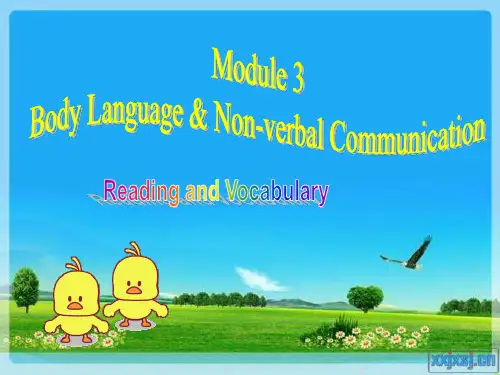
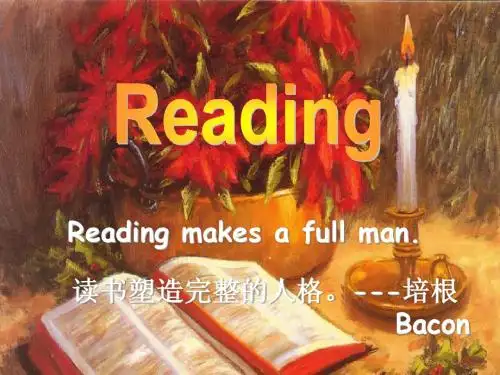
阅读的好处英语作文6篇阅读的好处英语作文篇1I think reading is important in the whole life for people. There are many benefits of reading. Firstly reading increases our knowledge and we can learn the world affairs without going out. Secondly reading is a good way to improve reading and writing skills. Before you learn to write you must know how others write. Thirdly reading can broaden our knowledge and horizon which is important to job hunting in the future. Finally reading helps us become self-cultivation that would be beneficial to our whole life. Therefore start to reading no matter how old you are and what you are doing. Then you may find the great charm and benefits of reading.我认为阅读对于人的一生都是很重要的。
读书有许多好处。
首先,阅读增加我们的知识,我们可以学习世界事务,而不出去。
其次,阅读是提高阅读和写作能力的好方法。
在你学会写作之前,你必须知道别人如何写作。
第三,阅读可以扩大我们的知识和视野,这是非常重要的求职未来。
最后,阅读帮助我们成为自我修养,这将有利于我们的整个生活。
阅读的重要性The Importance of ReadingAs the development of the world, there is more and more entertainment for people to kill time. Reading used to be an important amusement. But now there are less and less people fond of reading. But there are still a large number of people stand on the side of reading. For me, I think reading is very important. The reasons are as following.随着世界的发展,越来越多娱乐供人们消磨时光。
阅读在过去常常就是一种重要的娱乐。
但现在却越来越少人喜欢阅读了。
但仍然还有很多人是喜欢看书的。
对我来说,我认为阅读是很重要的。
理由如下。
First of all, reading can broaden our vision. The main way we learn the things happen long time ago is according to the book. People will try their best to write the things in their stage in their way. When we read books, we have the opportunity to learn everything. The content in the books contains the knowledge all over the world and every aspect. We can read the knowledge about biography, science, technology, culture, economic and so on from the book. It is hard not to broaden vision from reading.首先,阅读可以开阔我们的视野。
阅读的重要性ReadingMakesaFullMan英语作文在日常的学习、工作、生活中,大家都写过作文吧,作文一定要做到主题集中,围绕同一主题作深入阐述,切忌东拉西扯,主题涣散甚至无主题。
写起作文来就毫无头绪?以下是店铺为大家收集的阅读的重要性Reading Makes a Full Man英语作文(精选6篇),欢迎阅读与收藏。
阅读的重要性Reading Makes a Full Man英语作文1Reading is very important in our life. We can get knowledge through reading. It can not only open our minds but also make us more intelligent. Besides, reading is also one of the most important ways to learn a foreign language like English.阅读在我们生活中起到非常重要的作用。
通过阅读,我们不仅可以收获知识,开阔眼界,而且能够增长心智。
此外,阅读也是学好外语(比如英语)的一种最重要的方式之一。
Textbooks, newspapers, magazines and other kinds of reading materials can help us know more about the outside world and help us grow into an excellent person.无论是教科书、报刊杂志还是其他各种类型读物,都可以让我们更多地了解外面的世界,帮助我们成长为一个优秀的人。
Im planning to read at least 5 books in the coming holiday. And Ill spend more time reading every day in my senior high school life. Reading makes a full man! Lets start reading now.在即将到来的暑假,我打算至少读5本书。
8.1 Reading Test(A)Driving a car at high speed along a highway seems to be fun. You need only to follow the bright traffic(交通) signs beside the highways and it will take you to where you wish.But to a London taxi driver, driving is not an easy job. A taxi driver has to have not only good driving skills but also a good knowledge of the city of a London, from the smallest lane(小巷) to the most popular bar around. He has to be at the service of all kinds of passengers at all times.A certain London taxi driver told of his job as follows.During the night it is quite usual for him to stop two or three times for some refreshments (点心).He said. “I never drink when I’m working ---- I would lose my licence(执照).”He normally goes home between 2 and 3 O’clock in the night, There are times he has to stay longer and try to make more runs. He said, “That’s the worst thing about working for yourself. If you don’t make the money , no one is going to give it to you.”London taxi drivers not only ‘take’ but also ‘give’ , Every summer hundreds of children from London will go for a day at the sea--- by taxi! Their rides are paid by the taxi drivers, and these fares(车费) all go to the ‘London Taxi Fund for Underprivileged Children.’ At the sea. they are met by the mayor, and a lunch party is also held in honor of the taxi drivers and the children. After a happy day running around the sea beaches and visiting the market, the children go home again-- by taxi, and free of charge, of course!1. To be a London driver is not easy because ______.A. he has to follow the bright traffic signsB. he has to have good driving skills and know all the places in the cityC. he has to serve all kinds of passengers at all timesD. both B. and C2. The London taxi drivers _______.A. work hard because on one would give them money for doing nothingB. never stop driving in the cityC. only work between 2 and 3 o’clock in the nightD. are very rich3. The author of the passage says that _______.A. the taxi driver works longer than is necessaryB. the more runs the taxi driver makes, the more he getsC. the taxi driver doesn’t like to work for othersD. the taxi drivers in the city not only take money but also give money4. London taxi driver _______.A. take money because they have to pay for the children’s rideB. go to the sea for a day in the summerC. pay the fares for the poor children to the sea for a day once every yearD. give the poor children a free ride for a day at the sea once every year5. The underlined words Underprivileged Children mean children _______.A. of low income familiesB. who like to travel in taxiC. who wish to go to sea but have no moneyD. from London(B)Read the following directions on a bottle of medicine:“Take two tablets(药片)with water, followed by one tablet every eight hours, as required, Formaximum(最大量) night-time and early morning relief(缓解疼痛), take two tablets at bed - time, Do not take more than six tablets in twenty-four hours.For children six to twelve years old, give half the amount for a grownup. For children under six years old, ask for your doctor’s advice.Reduce the amount if nervousness, restlessness, or sleeplessness occurs,”1. The directions on this medicine bottle clearly warn the patient not to take more than .A. twenty-four tablets a day.B. eight tablets a day.C. six tablets a day.D. three tablets a day.2. We can infer from the directions that .A. the medicine could cause some people to feel nervous.B. children may take the same amount that grown-ups take.C. one may not take this medicine before going to bed.D. the medicine is a liquid.3. If one cannot sleep, it is suggested that he .A.take two tablets before going to bed.B.take less than two tablets before going to bed.C. stop taking the medicine.D. ask advice of a doctor.4. Obviously the medicine .A. may be dangerous to small children.B. cannot be taken by children under twelve years old.C. may be taken by children but not by grown-ups.D. may be taken by grown-ups but not by children.(C)I’m a Chinese student studying in Canada. I have been a boarder(寄宿生) with the Carsons for more than a year and a half.The Carsons live in their own house, which has four bedrooms including the one in thebasement(底层) which I live in. Judy does all the work in the house and Andrew is responsible for the work in the garden. When they go out in they evening, they often ask me to look after their children.Judy’s parents, Mr. and Mrs. Morris, lived in another city. Judy was their only child and naturallythey doted on(溺爱) Judy’s children. They often sent the children presents.Last April Mr. Morris died. Now that Mrs. Morris was quite alone, I expected that Judy would want her to come and live with them. One day, Margaret told me grandma was coming to live with them and her daddy and mummy would want my room back. The news didn’t surprise me and the next day I went to Judy and asked her about it. I said I couldn’t think of living in their basement room any longer if it was needed for Mrs. Morris. Judy seemed surprised at first. Then she told me there was no deed for me to move, for they hadn’t yet come to any decision about her mother coming to live with them. “Naturally I’m worried about my mother. She has been in poor health.”She smiled sadly and added. “To be honest, Andrew and my mother have never got on well. We’llwait a bit and see what happens. Perhaps Moter will be all right living herself, of perhaps they will both change their minds.”That was six months ago. During this time I’ve heard that Mrs. Morris has had two illnesses and that her health has got worse. A nursing home was mentioned once but Mrs. Morris refused to go there. So up to now she’s still living alone and I’m still living in the basement room.1. What is the relationship between the speaker and the Carsons?A. He is a brother of Andrew Carson.B. He is a close friend of the Carsons.C. He is a student of Judy Carson.D. He is a student who pays to live and have meals at the Carsons’ house.2. Why did the speaker expect Mrs. Morris to come to live with her daughter?A. Because Mr. Morris was dead.B. Because Mrs. Morris suffered from illness.C. Because Mrs. Morris lived all by herself.D. Because of all the reasons mentioned in A, B and C.3. Which of the following statements is NOT true according to the passage?A. Mrs. Morris was coming to live with the Carsons, so they asked the speaker to move.B. Judy had no brothers or sisters to look after her mother.C. Mrs. Morris loved her grandchildren very much.D. The Carsons once suggested that Mrs. Morris go to live in a nursing home.4. Why didn’t Mrs. Morris come to live with her daughter’s family?A. Because the speaker lived in the basement room and there was no other room for her to live in.B. Because she did not have a good relationship with her son-in-law.C. Because she was in rather poor health and could not come.D. Because she did not want to leave her own house.5. Which of the following would be the best title for the passage?A. My Landlady.B. The Boarder.C. Family Relationships is Canada.D. Nursing Homes and the Aged.(D)Robert is nine years old and Joanna is seven. They live at Mount Ebenezer. Their father has a big property. In Australia they call a farm a property.Robert and Joanna like school very much. At school they can talk to their friends but Robert and Joanna cannot see their friends. They live 100, perhaps 300, miles away and like Robert and Joanna, they all go to school by radio.Mount Ebenezer is in the centre of Australia. Not many people live in “The Centre”. There are no schools with desks and blackboards and no teachers in “The Centre”. School is a room at home with a two-way radio. The teacher also has a two-way radio. Every morning she calls each student on the radio. When all students answer, lessons begin… Think of your teacher 300 miles away!1. The children in “The Centre” do not go to a school because ______.A. they live too far away from one another.B. they do not like school.C. they are not old enough to go to school.D. their families are too poor.2. In order to send their children to school, parents in “The Centre” of Australia must have ______.A. a property.B. a car.C. a school room at home.D. a special radio.3. Teachers in “The Centre” of Australia teach ______.A. not in a classroom but at the homes of the students.B. by speaking only and not showing anything in writing.C. without using any textbooks or pictures.D. without knowing whether the students are attending .4. When children are having a lesson, they can hear their teacher.A. but their teacher cannot hear them.B. and their teacher can hear them too.C. but cannot hear their schoolmates.D. and see him or her at the same time.5. A “Property” in Australia is aA. house.B. school.C. farm.D. radio.。
reading的意思复数形式:readings;reading的意思 1名词阅读; 读数; 宣读; 读物动词读( read的现在分词); 看懂; 理解; 显示,标明reading的翻译reading的意思 2名词1. Reading makes a full man.阅读使人充实。
2. What is her reading of the facts?她对这些事实是怎么看的?3. He is a man of wide reading.他是个博览群书的人。
4. I enjoy music and reading.我喜欢音乐和阅读。
5. reading5. These books make good reading.这些书读起来很有趣。
reading的意思 4兴趣爱好A:What do you do in your spare time?你怎么打发你得业余时间?B:I like to play golf and badminton.我喜欢打高尔夫球和羽毛球。
A:What do you usually do every evening?你通常每天晚上都做什么?B:I just like to sleep like a lazy cat.我只喜欢像懒猫一样睡大觉。
A:What’s your favorite hobby?你最大的爱好是什么?reading是什么意思B:My favorite sport is tennis.我最喜欢的运动是打网球A:Do you like to read books?你喜欢读书吗?B:I enjoy reading so much that I always read in a quiet afternoon with a cup of good coffee.我非常喜欢读书,常在安静的下午一边喝一杯香浓的咖啡一边读书。
A:By the way, would you like to see movies.顺便问一下,你喜欢看电影吗?B:That’s OK.还可以吧!保险A:Now that we’re about to own a house, I think we should get it covered.我们快拥有一所房子了,我想我没应该给房子买保险。
K3 Reading幼儿园三岁阅读
∙General sound discrimination: environmental, instrumental, body percussion
∙语音的一般识别:环境,工具,肢体动作
∙Rhythm and rhyme, alliteration, voice sounds
∙节奏和韵律,头韵,声音
∙Oral blending and segmenting
∙口语原音拼合拆解
∙Make connections to their own experience when listening to or “reading” texts
∙在聆听或“阅读”文本时建立自己英语学习经验
∙Select and reread favorite texts for enjoyment
∙为培养兴趣可选择自己喜爱的文字重复读
∙Understand that print is permanent, for example, when listening to familiar stories, notices when the reader leaves out or changes parts
∙要知道印记是永久性的,例如,听着熟悉的故事时,会注意到读者省去或改变的部分
∙Participate in shared reading, posing and responding to questions and joining in the refrains.
∙参与共享阅读,提出问题并回答问题,并参与避免。
∙Recognize their own first name.认识自己的名字。
∙Distinguish between pictures and written text, for example, can point to a picture when asked
∙图片和手写区分,例如,可以指向图片时提问
∙Join in with chants, poems, songs, word games and clapping games, gaining familiarity with the sounds and patterns of the language of
instruction.
∙加入诗歌,诗词,歌曲,文字游戏和拍手游戏,熟悉教学语言的声音和模式。
∙Handle books, showing an understanding of how a book works, for example, cover, beginning, directional movement, end
∙处理书籍,显示对书籍如何工作的理解,例如封面,开始,定向移动,结束
∙Listen attentively and respond actively to read- aloud situations; make predictions, anticipate possible outcomes
∙仔细倾听并积极响应朗读; 做出预测,预测可能的结果
@@@@@@@@@@@@@@@@@@@@@@@@@@@@
∙General sound discrimination: environmental, instrumental, body percussion
∙语音的一般识别:环境,工具,肢体动作
∙Rhythm and rhyme, alliteration, voice sounds
∙节奏和韵律,头韵,声音
∙Oral blending and segmenting
∙口语原音拼合拆解
∙Introduction to letters and sounds Phase 2 (Letters and sounds)
∙介绍字母和发音阶段2(字母和发音)
∙Sets 1-5 letters and words
∙设置1-5个字母和单词
∙Make connections to their own experience when listening to or “reading” texts
∙在聆听或“阅读”文本时建立自己英语学习经验
∙Select and reread favorite texts for enjoyment
∙为培养兴趣可选择自己喜爱的文字重复读
∙Participate in shared reading, posing and responding to questions and joining in the refrains
∙参与共享阅读,提出问题并回答问题,并参与避免
∙Participate in guided reading situations, observing and applying reading behaviors and interacting effectively with the group.
∙参与引导阅读的情况,观察和应用阅读行为,并与小组进行有效的交流。
∙Have a secure knowledge of the basic conventions of the language(s) of instruction in printed text, for example, orientation, directional
movement, layout, spacing, punctuation.
∙对印刷文本的指导语言的基本约定有一个安全的知识,例如,方向,定向移动,布局,间距,标点符号。
∙Make connections between personal experience and storybook characters
∙建立个人经验和故事书人物之间的联系
@@@@@@@@@@@@@@@@@@@@@@@@@@@@
∙Consolidation of letters and sounds Phase 2
∙巩固字母和发音阶段2
∙Read their own and their friends names.
∙阅读他们自己和他们的朋友的名字
∙Sets 1-5 letters and words
∙设置1-5个字母和单词
∙Tricky words, an increasing sight vocabulary.
∙不规则单词,增加越来越多的视觉词汇
∙Blending words Use of letters and sounds Phase 4
∙使用字母和发音阶段4的混合单词
∙Express opinions about a story.
∙能表达对一个故事的意见
∙Use meaning, visual, contextual and memory cues, and cross-check cues against each other, when necessary (teacher monitors miscues to identify strategies used and strategies to be developed.)
∙在必要时使用意义,视觉,背景和记忆线索,并互相交叉使用核对线索(教师监督指正错误以确定使用的策略和将要制定的策略)。
∙Read and understand familiar print from the immediate environment, for example, signs, advertisements, logos, ICT iconography
∙阅读并理解来自周围环境的熟悉的标识,例如标志,广告,标识,ICT 图像
∙Instantly recognize an increasing bank of high- frequency and high-interest words, characters or symbols.
∙立即认出一大堆高频率和高利率的语言,字符或符号。